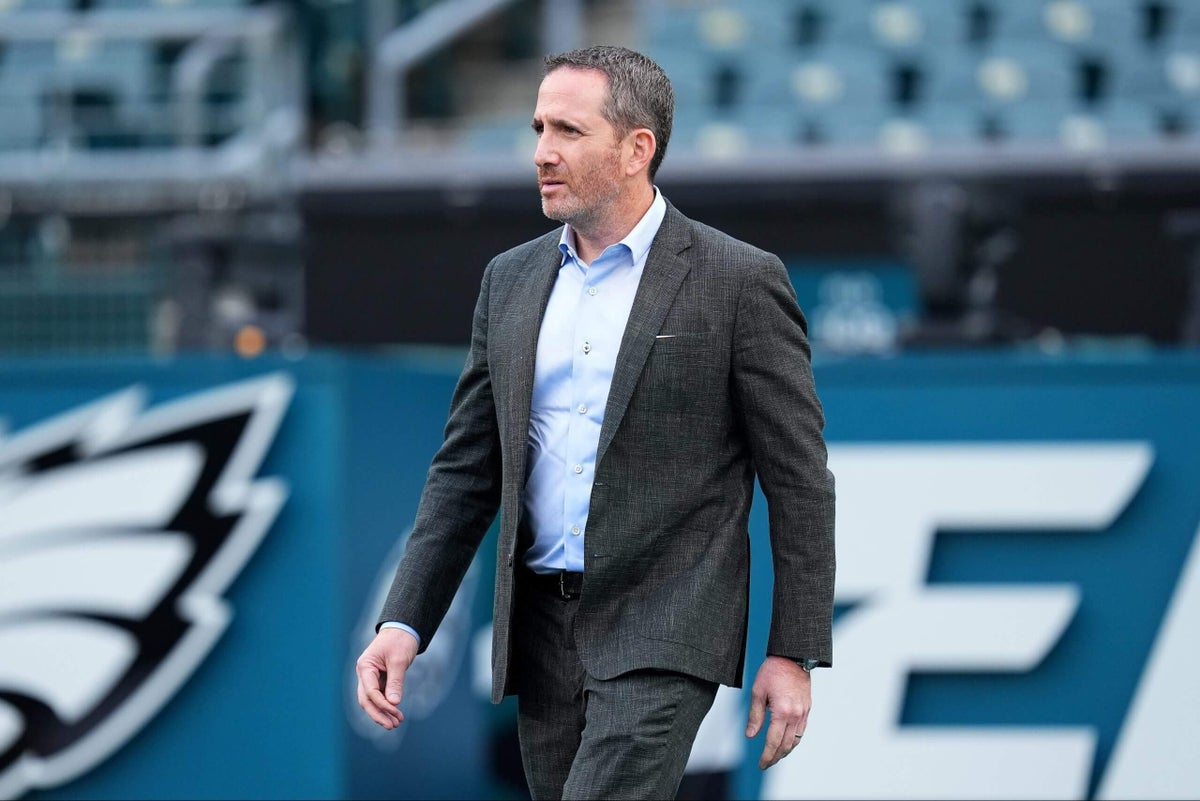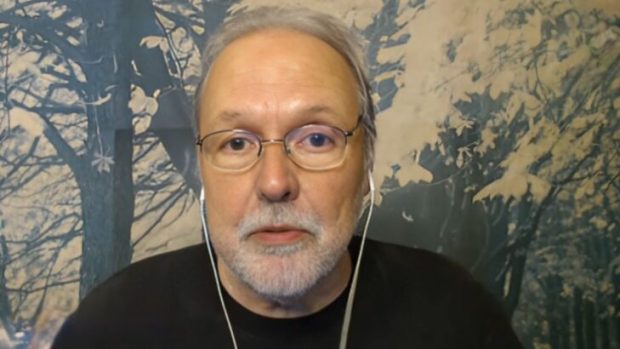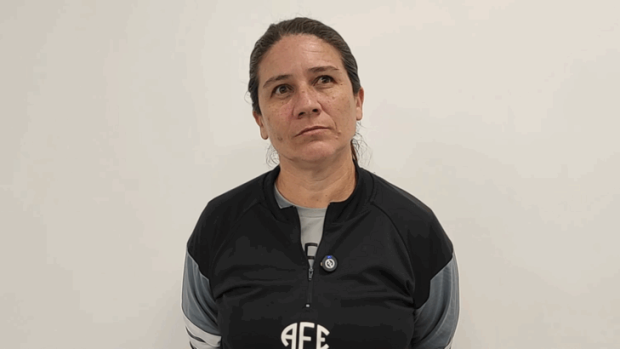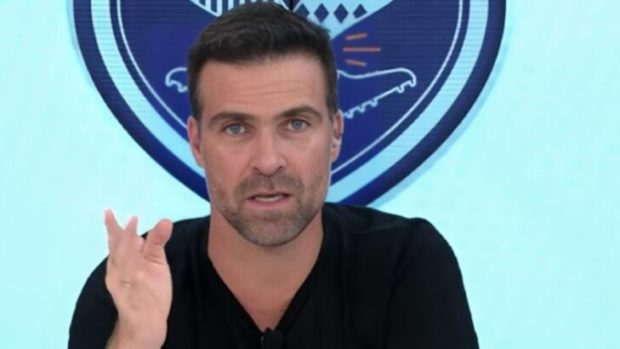

PALM BEACH, Fla. — The second landing of a swanky fountain staircase at The Breakers resort was a fitting setting to discuss the stability of the Philadelphia Eagles’ golden era.
There Howie Roseman stood, the architect of the franchise’s second Super Bowl roster, explaining why swapping out certain pillars is essential to keep the whole thing from tumbling down. The Eagles operate on a budget. (The staircase, doubtful.) It’s evident Roseman doesn’t enjoy chipping into sentimentalities that feel like stone. It’s the first time Roseman spoke publicly about trading starting safety C.J. Gardner-Johnson, a budget-oriented move that netted a questionable return — albeit a more affordable one. It’s obvious Philadelphia’s platform is now more precarious, an unsettling reminder that the present never lasts.
Advertisement
“It’s a tough decision,” Roseman said of the trade. “It wasn’t an easy decision to make — certainly these calls over a week period where you’re losing players you just won a championship with, and the majority of them, if not all of them, would have been happy to stay in Philadelphia. It was tough. It wasn’t a fun time.”
The offseason is unfolding largely as Roseman said at the combine it would. “We know we’re not gonna be able to keep everyone,” supplied the refrain for a series of cash-strapped decisions. The majority were expected. The Eagles were never going to pay Milton Williams the $26 million per year that made the defensive tackle the highest-paid player in New England Patriots history. Josh Sweat, Mekhi Becton and Isaiah Rodgers weren’t going to be easily retained after the Eagles awarded Saquon Barkley and Zack Baun record-setting contracts. Darius Slay and James Bradberry were reasonable cap casualties in advance of the extensions that will secure the team’s next generation of core players.
No NFL team can escape the salary cap. Even the Eagles’ strategy of stretching out cap hits by stowing guaranteed money in voidable years has its limits. They have eight players who’ll account for at least $14 million in cash payouts in 2025. Eight starters from the 2024 roster were acquired by the Eagles in the previous three draft cycles; none are playing under long-term contracts. The Eagles are in the enviable position of having nurtured a strong body of players, and they now must be selective in their surgery to prevent the budget from becoming unwieldy.
“We never want to be in a situation where we have one year where we’re getting rid of 20 guys,” Roseman said.
The long-time general manager is once again maintaining a team that’s reached the mountaintop. He’s equipped with the lessons learned from the franchise’s first Super Bowl victory and its swift decomposition into a disastrous 2020 season. Entering 2018, the Eagles, too, had a strong core of veterans tied to whom they believed was their franchise quarterback. But those Eagles were older (average age of starters: 27.8), and Roseman, committing to his aging core, diminished their already limited draft capital by executing trades that exacerbated their long-term needs, particularly at wide receiver. Among the failures: Carson Wentz was dramatically jettisoned, 2019 first-rounder Andre Dillard flopped (for whom Roseman traded three picks to select) and Nigel Bradham was unceremoniously released two years into the linebacker’s five-year, $40 million deal.
A relevant adaptation appears to be that Roseman is now more proactive about tidying the books with a younger team that’s supported by a deeper arsenal of draft picks. One could say the Baun extension is foreboding given the precedent Bradham’s fallout set for the organization’s valuation of the position. But Bradham, unlike Baun, was never a Pro Bowler, All-Pro or a finalist for the NFL’s Defensive Player of the Year. Baun, like Barkley and others who’ve received major extensions, falls into what Roseman categorized as an award following an “extraordinary performance from extraordinary players and people.” The Eagles were definitive about their intent to re-sign Baun, who demonstrated promise immediately. A younger Roseman might have attempted a mid-year extension — as he once did for Brandon Brooks and Lane Johnson in 2019 — but experience altered his philosophy on such negotiations.
Advertisement
“The conscious decision is basically like the team is going so well, you don’t want people to think we’re picking favorites and then make other people become independent contractors and go, ‘Well, if they’re signing him, they’re not going to sign me, in which case I’ve got to play for myself,’” Roseman said. “So those things, though, at the end probably cost you money and they probably change the nature of it. So, you could see very early on the difference that Zack was making as a player on our football team. And that didn’t mean we didn’t want to keep him. It was just because we had all these other free agents who were also playing well, we made a conscious decision to say, ‘Hey, we’re going to try to double down on the season and do whatever we can to win a world championship. And then we’ll deal with the ramifications.’”
And instead of kicking the financial ramifications of Baun’s signing down the road, Roseman said he chose to create immediate cash flexibility by trading Gardner-Johnson.
“Every dollar that you spend is a dollar less that you can spend on some of these younger players that maybe you want to retain,” Roseman said. “So getting out in front of it was important to us. And again, hard decisions. Not asking anyone to agree with them, but that’s part of our job.”
The same fate might soon also come for Dallas Goedert. The 30-year-old tight end is entering the final season of a four-year, $57 million contract extension. He’s effective when healthy but hasn’t been fully available since his rookie season and missed seven games last year with knee and hamstring injuries. The long list of injuries, plus the $14.3 million in cash he’s owed in 2025, would be significant factors in finding a trade partner. Like at safety, the Eagles have a potential replacement playing on a rookie contract (Grant Calcaterra), and they signed veterans Harrison Bryant and Kylen Granson in free agency.
The logic here is that the Eagles are making such alterations while they’re still a Super Bowl-caliber team — not once things begin to slide. The trade did not leave them without holes. The Eagles now have a vacancy at safety opposite Reed Blankenship. But the Eagles, searching for ways to increase their budget, held confidence in Sydney Brown, a third-round pick in 2023 who fulfilled a special teams role after returning from an ACL tear during Week 18 of his rookie season. “That was one of the few positions that we had drafted a young player fairly high and that player hasn’t had an opportunity to play,” Roseman said. Brown still must “earn it,” Roseman added. The Eagles are also armed with eight draft picks (all within the top 168) that could supply another option to the mix.
Advertisement
The Eagles’ return for Gardner-Johnson indeed warrants skepticism. In addition to a swap of Day 3 picks in 2026, the Houston Texans sent offensive guard Kenyon Green, a former 2022 first-round pick who underperformed in his first three seasons. It’d be hubris for the Eagles to expect they can reliably rehabilitate struggling offensive linemen, as they just did with Becton, a 2020 first-round offensive tackle selected by the New York Jets who, after spending one season at right guard with the Eagles, signed a two-year, $20 million deal with the Los Angeles Chargers. Green will also compete with Tyler Steen, a 2023 third-round pick who lost the training camp battle to Becton.
The Eagles accept that they will not look the same in 2025, especially on defense. But the organization is effectively acting on its confidence in what’s effectively a strong middle class of young defenders they’ve drafted (or picked up as undrafted free agents) — Blankenship, Jalen Carter, Nakobe Dean, Jordan Davis, Moro Ojomo, Kelee Ringo, Quinyon Mitchell, Cooper DeJean and Jalyx Hunt — to provide stability as the team continues to acquire players, especially in the draft.
“We’re incomplete right now. There’s no doubt about it,” Roseman said. “Talent acquisition season has just started and it goes for a long time and we continue to try to find any possible ways to upgrade the depth and the talent level on our team.”
(Top photo of Howie Roseman: Mitchell Leff / Getty Images)
This news was originally published on this post .











Be the first to leave a comment